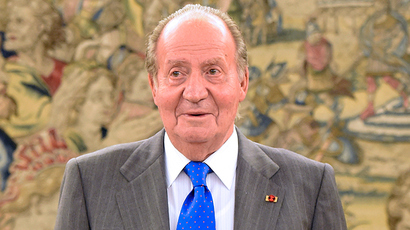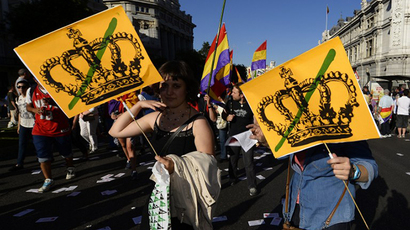Anti-monarchy rally hits Madrid, 10 injured, 3 arrested (PHOTOS, VIDEO)
At least 10 people have been injured and three arrested after anti-monarchy protesters clashed with police in the Spanish capital, Madrid. The activists slammed monarchy, saying it’s a “dictatorship” and “corrupt”.
At least 500 people gathered in Puerta del Sol, one of the best known and busiest places in the heart of Madrid, reported Ruptly news agency. The activists were demanding reform to the country’s constitution and the abolition of the monarchy.
The protesters were holding banners saying “Constituent Processes now! Monarchy is not democracy, it is dictatorship and corruption," reported El Nuevo Herald newspaper.
“Republic again!" chanted the audience, holding placards with the face of King Felipe VI, who was depicted as the Great Dictator, according to El Mundo.
The demonstration was peaceful at first, but turned violent when the participants tried to march to the Spanish Parliament.
Police arrested at least three protesters, reported Ruptly, adding that 10 people were injured during the clashes. Spanish newspaper 20 Minutos said six people were injured and three arrested, including two women, in the scuffles.
¿Qué diría la prensa... si es Venezuela?: "Maduro reprime al pueblo" si es España?: "La manifestación era ilegal" pic.twitter.com/DBejSAM7nT
— Tropa Marxista (@tropamarxista) October 5, 2014
Felipe VI became the country’s new monarch in June after his father Juan Carlos abdicated after almost 40 years on the throne.
The day the new king was crowned, thousands took to the streets to demand the abolition of the monarchy.
Nos informan d q nuestro compañero Luis está ingresado con una ISQUEMIA CORONARIA producida x la brutalidad policial pic.twitter.com/ZJ8nqgKx8M
— Coordinadora25S (@Coordinadora25S) October 4, 2014
Spain’s monarchy is descended from the ancient line of Bourbons, who ruled France before and after the 1789 revolution. Former King Juan Carlos’s grandfather, King Alfonso XIII, fled the country in the face of a popular revolt in 1931 and the country became a republic.

The royal family saw its reputation peak back in 1975 when, on the death of fascist dictator General Francisco Franco, Juan Carlos was invited to become king. He initially gained widespread popularity for playing an active part in building a modern democracy.
However, as the country plunged into a deep economic recession by 2011, a series of corruption scandals made a huge dent in the royal family’s reputation.

Juan Carlos abdicated in favor of his son, Felipe, in June this year.
In the meantime, monarchists hope for a new era of popularity for the troubled royal family, which has been the subject of a series of corruption scandals as a recession pushed millions of Spaniards deeper into poverty.














